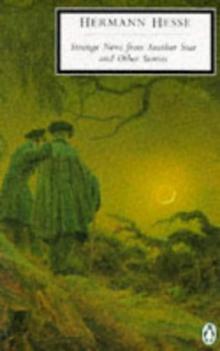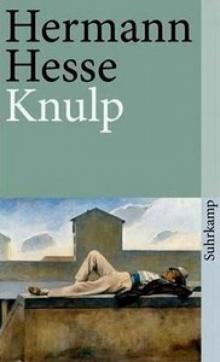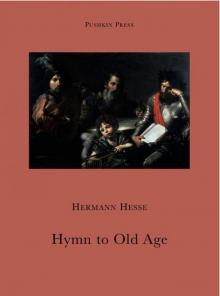- Home
- Hermann Hesse
Strange News From Another Star
Strange News From Another Star Read online
Hermann Hesse
Strange News from Another Star
And Other Stories
Translated from the German by Denver Lindley
Penguin Books
ISBN 0140041001
Penguin Modern Classics
The short stories in this book demonstrate the intriguing mystical qualities which make Hermann Hesse such a rich and powerful writer.
Among others there is the tale of Augustus, whom everybody loved on sight, but who only found happiness when he was hated; of Han Fook, who forsook the world to learn all he could about the poet's art; and of Faldum, the city, whose annual fair turned into a miracle.
The author's delight in detail and his lyrical appreciation of beauty make this a collection to treasure.
The cover shows a detail from 'Two Men Gazing at the Moon' by Caspar David Friedrich, in the Staatliche Kunstsammlungen, Dresden (photo: Gerhard Reinhold)
Hermann Hesse was born at Calw, Germany, on 2 July 1877. Having begun his career as a bookseller in Tubingen and Basle, he started to write and to publish poetry at the age of twenty-one. Five years later he enjoyed his first major success with his novels on youth and educational problems: first Peter Camenzind, then Unterm Rad (The Prodigy), followed by Gertrude, Rosshalde, Demian, and others. Later, when as a protest against German militarism in the First World War he settled permanently in Switzerland, he established himself as one of the greatest literary figures of the German-speaking world. His humanity, his searching philosophy developed further in such novels as Der Steppemwolf and Narziss und Goldmund, while his poems and critical writings won him a leading place among contemporary thinkers. The Nazis abhorred and suppressed his books; the Swiss honoured him by conferring on him the degree of Ph.D.; the world paid homage to him, finally, by bestowing upon him in 1946 the Nobel Prize for literature, an award richly deserved by his great novel Das Glasperlenspiel (The Glass Bead Game). Hermann Hesse died in 1962, shortly after his eighty-fifth birthday.
Contents
Augustus 7
The Poet 30
Flute Dream 38
Strange News from Another Star 46
The Hard Passage 64
A Dream Sequence 71
Faldum 84
Iris 104
Augustus
A young woman living in Mostackerstrasse had lost her husband through an accident shortly after their marriage, and she now sat poor and abandoned in her little room, waiting for the child who was destined to be fatherless. And because she was so utterly alone, her thoughts dwelt constantly on the expected child, and there was nothing beautiful and splendid and enviable that she did not plan and wish and dream for the little one. A stone house with plate-glass windows and a fountain in the garden seemed to her just barely good enough for him, and as for his career, he had to become at least a professor or a king.
Next door to poor Frau Elisabeth lived an old man, a little grey fellow who seldom walked abroad and, when he did so, wore a tasselled cap and carried an old-fashioned green umbrella with whalebone ribs. Children were afraid of him and grownups said to one another that he probably had good reason to live in so retired a fashion. Often he would not be seen by anyone for a long time, but sometimes in the evening a delicate music, as though from a great number of tiny, fragile instruments, would drift out of his dilapidated little house. Then the children passing by would ask their mothers whether angels were singing inside, or perhaps fairies, but their mothers knew nothing about such things and would say: 'No, no, that must be a music box.'
This little man, who was known to his neighbours as Herr Binsswanger, had an odd kind of friendship with Frau Elisabeth. As a matter of fact, they never spoke to each other, but little old Herr Binsswanger bowed in the most friendly fashion every time he went past her window, and she nodded gratefully in return and liked him, and both thought: If things should sometimes go very ill with me, then I shall certainly go for help to my neighbour's house. And when it began to grow dark and Frau Elisabeth sat alone at her window and sorrowed for her dead beloved or thought about her little child and fell to dreaming, then Herr Binsswanger would gently open his casement window and out of his dark room flowed comforting music, soft and silvery like moonlight through a rift in the clouds. For her part, Frau Elisabeth tended several old geranium plants growing at his back window; he always forgot to water them but they were always green and full of blossoms and never showed a wilted leaf because Frau Elisabeth took care of them very early every morning.
And now one raw and windy evening when it was getting on towards autumn and no one was abroad in Mostackerstrasse, the poor woman realized that her hour had come and she was frightened because she was entirely alone. But as night fell, an old woman came on foot with a lantern in her hand; she entered the house and boiled water and laid out linens and did everything that is needful when a child is about to come into the world. Frau Elisabeth allowed herself to be looked after in silence, and only when the baby was there, wrapped in fine new swaddling clothes, and had begun his first sleep on earth, did she ask the old woman whence she had come.
'Herr Binsswanger sent me,' said the woman, whereupon the weary mother fell asleep; and when she awoke in the morning, milk had been boiled and stood ready for her, everything in the room had been neatly arranged, and beside her lay her little son, screaming because he was hungry; but the old woman was gone. Frau Elisabeth took the baby to her breast and rejoiced that he was so pretty and so strong. She thought of his dead father who had not lived to see him, and tears came to her eyes.
But she hugged the little orphan child and smiled once more, then fell asleep again with the little one. When she woke up, there was more milk, a soup had been cooked, and the child was wrapped in clean linens.
Soon the mother was healthy and strong again and could look after herself and little Augustus. She realized then that her son must be christened and that she had no godfather for him. And so towards evening, when twilight had come and the sweet music was once more pouring out of the little house next door, she went over to Herr Binsswanger's. She knocked timidly and was greeted by a cordial cry: 'Come in!' The music suddenly ceased, and in the room there was a little old table with a lamp and a book on it, and everything was as normal as could be.
'I have come to thank you,' said Frau Elisabeth, 'because you sent me that good woman. I wish to pay her too, as soon as I can work again and earn some money. But now I have another worry. The little boy must be christened and is to be named Augustus after his father. But I know no one and I have no godfather for him.'
'Yes, I have thought about that too,' said her neighbour, stroking his grey beard. 'It would be a good thing if he were to have a kind, rich godfather who could look after him if things should ever go badly for you. But I too am lonesome and old and have few friends and so I cannot recommend anyone to you, except perhaps myself, if you would accept me.'
This made the poor mother happy, and she thanked the little man and enthusiastically agreed. The next Sunday they carried the baby to the church and had him baptized, and the same old woman appeared there too and gave the child a taler. When Frau Elisabeth did not want to accept it, the old woman said: 'No, take it. I am old and have what I need. Perhaps the taler will bring him luck. I was glad for once to do a favour for Herr Binsswanger. We are old friends.'
They went back to Frau Elisabeth's room together and she made coffee for her guests. Herr Binsswanger had brought a cake, so it turned into a real baptismal feast. After they had finished eating and drinking and the infant had long since fallen asleep, the old man said diffidently: 'Now that I am little Augustus's godfather, I would like to present him with a king's palace and a sackful of gold pieces, but those ar
e things I do not have. I can only add another taler to the one from our neighbour. However, what I can do for him shall be done. Frau Elisabeth, you have certainly wished your little boy all sorts of fine and beautiful things. Now think carefully what seems to you to be the best wish for him, and I will see to it that it comes true. You have one wish for your youngster, whatever one you like, but only one. Consider well, and this evening when you hear my little music box playing, you must whisper your wish into your little one's left ear, then it will be fulfilled.'
Thereupon he hastily took his departure and the neighbour woman went away with him, leaving Frau Elisabeth dumbfounded, and if the talers had not been there in the crib and the cake on the table, she would have thought it all a dream. She sat down beside the cradle and rocked her child while she meditated and considered many beautiful wishes. At first she planned to make him rich, then handsome, then tremendously strong, then shrewd and clever, but at each choice she felt some hesitation, and finally she concluded that all this was really only the little old man's joke.
It had already grown dark and she had almost fallen asleep sitting beside the cradle, for she was weary from playing hostess, from her troubles and from thinking of so many wishes, when suddenly there drifted over from next door a faint, subtle music, more beautiful and delicate than had ever been heard from a music box. At the sound Frau Elisabeth gave a start and remembered, and now she once more believed in her neighbour Binsswanger and his gift as godfather, but the more she reflected and the more she wanted to make a wish, the more confused her mind became, so that she could not decide upon anything. She was greatly distressed and had tears in her eyes, then the music sounded softer and fainter, and she knew that if she did not make a wish that very instant, it would be too late.
She sighed aloud and bent over her boy and whispered in his left ear: 'My little son, I wish for you - I wish for you -' and as the beautiful music became fainter and fainter, she was frightened and said quickly:' - I wish for you that everyone will love you.'
The strains had now completely died away and it was deathly still in the dark room. She bent over the cradle and wept and was filled with anxiety and fear, and she cried: 'Oh, now that I have wished for you the best thing I knew, perhaps it was not the right thing. And if everyone, every single person, loves you, still no one will ever love you as much as your mother does.'
Augustus grew up to be a pretty blond boy with bright, mettlesome eyes whom his mother spoiled and who was well liked by everyone. Frau Elisabeth quickly realized that her christening-day wish for her child was coming true, for the little one was hardly old enough to walk on the streets when everyone he met found him so pretty and pert and clever that they patted his hand and openly admired him. Young mothers smiled at him, old women gave him apples, and if at any time he was naughty, no one believed that he could have done wrong; or if it was obvious that he had, people shrugged their shoulders and said: 'You really can't hold anything against that dear little fellow.'
People who had noticed the handsome boy came to see his mother, and she who had once been so alone and had had very little sewing work to do, now as the mother of Augustus had more patrons than she could ever have wished. Things went well with her and with the youngster too, and whenever they went out walking together, the neighbours smiled and bowed to them and turned to look after the lucky boy.
What was best of all happened to Augustus next door at his godfather's. Herr Binsswanger would sometimes call him over to his house in the evening when it was dark and the only light in the room was the little red fire burning in the black hollow of the fireplace. The old man would draw the child down beside him on a fur rug on the floor and would tell him long stories as they both stared at the quiet flames. Occasionally, when a long story was at an end and the little boy had grown very sleepy staring with half-open eyes at the fire in the dark silence, then out of the darkness flowed sweet polyphonic music, and when the two had listened to it for a long time in silence, it often happened that the whole room was suddenly filled with tiny sparkling cherubs who flew in circles on bright golden wings, dancing elaborately about one another in pairs and singing at the same time. The whole room resounded in a hundredfold harmony of joy and serene beauty. It was the loveliest thing Augustus had ever experienced, and when later on he thought of his childhood, it was the dark, quiet room of his old godfather and the red flames in the fireplace and the music and the festive, golden, magic flight of the angelic beings that filled his memory and made him homesick.
As the boy grew older, there were times when his mother was sad and felt compelled to think back to that baptismal night. Augustus ran merrily about in the nearby streets and was welcome everywhere. People gave him nuts and pears, cookies and toys, all kinds of good things to eat and drink, set him on their knees, let him pick flowers in their gardens, and often he did not get home until late in the evening and would angrily push aside his mother's soup. If she then was unhappy and wept, he would look bored and go sullenly to his cot. If she scolded or punished him, he screamed and loudly complained that everyone except his mother was nice and kind to him. She was often seriously angry at her son at these troubled times, but later, as he lay sleeping among his pillows and the light of her candle shimmered in his innocent, childish face, then all harshness left her heart, and she would kiss him cautiously so as not to awaken him. It was her fault that everyone loved Augustus, and sometimes she thought with sorrow and almost with dread that perhaps it would have been better had she never made that wish.
Once she happened to be standing beside Herr Binsswanger's geranium window, cutting the withered leaves from the plants with a small pair of shears, when she heard the voice of her son in the courtyard that lay behind the two houses, and turned around to look for him. He was leaning against the wall with a disdainful look on his pretty face, and in front of him stood a girl taller than he was, saying coaxingly: 'Come now, you'll be nice, won't you, and give me a kiss?'
'I don't want to,' Augustus said, putting his hands in his pockets.
'Oh, please do,' she said again. 'I'll give you something nice.'
'What will you give me?' the boy asked.
'I have two apples,' she said timidly.
'I don't want any apples,' he said contemptuously and started to leave.
But the girl caught hold of his arm and said cajolingly: 'Wait, I have a beautiful ring too.'
'Let's see it!' Augustus said.
She showed him her ring, and he looked at it carefully, then took it off her finger and put it on his own, held it up to the light and nodded approvingly.
'All right then, you can have a kiss,' he said carelessly, and gave the girl a hasty peck on the mouth.
'You'll come and play with me now, won't you?' she said confidently, taking his arm.
But he pushed her aside and shouted rudely: 'Leave me in peace, can't you? I have others to play with.' The girl began to cry and stole out of the courtyard. He looked after her with a bored and exasperated expression, then he turned the ring around on his finger and examined it. He began to whistle and walked slowly away.
His mother stood still with her gardening shears in her hand, shocked at the harshness and contempt with which her child had treated another's love. She turned away from the flowers and shook her head and said over and over to herself: 'Why, he's bad, he has no heart at all.'
When Augustus came home a short time later, she took him to task, but he looked at her laughingly with his blue eyes and showed no sign of guilt. Then he began to sing and he was so affectionate with her, so funny and charming and tender, that she had to laugh, and she decided that with children one need not necessarily take everything so seriously.
But the youngster did not entirely escape punishment for his misdeeds. His godfather Binsswanger was the only one for whom Augustus felt any regard, and in the evening when he went to see him his godfather would say: 'Today no fire is burning on the hearth and there is no music, the little angel children are sad because yo
u were so bad.' The boy would go home in silence and throw himself on his bed and weep, and for many days afterwards he would try hard to be good and kind.
Nevertheless, the fire on the hearth burned less and less often, nor could his godfather be bribed with tears or caresses. By the time Augustus was twelve years old, the enchanting, angelic flight in his godfather's room had already become a distant dream, and if by chance he did actually dream about it in the night, then on the following day he would be doubly wild and boisterous and order his many friends about with the ruthlessness of a field marshal.
His mother had long since grown tired of hearing from everyone how fine and charming her boy was; she had, in fact, nothing but trouble with him. And when one day his teacher came to her and said he knew of someone willing to enter her son in a distant school, she went next door and had a talk with her neighbour. Soon thereafter on a spring morning a carriage drew up and Augustus in a fine new suit got in and said farewell to his mother and his godfather and all the neighbours because he was to travel to the capital and study there. His mother had neatly parted his blond hair for the last time, had given him her blessing, and now the horses moved off and Augustus rode away into the great world.
Many years later when Augustus was a college student and wore a red cap and a moustache, he travelled back once more by carriage to his home town because his godfather had written that his mother was very ill and could not live long. The youth arrived in the evening, and people were amazed to see him get out of the carriage followed by the coachman, who carried a big leather trunk into the house. Frau Elisabeth lay dying in the old low-ceilinged room, and when the handsome student saw her looking white and withered on the white pillows, only able to greet him with her quiet eyes, he sank down weeping by the bed; and he kissed his mother's chill hands and knelt beside her the whole night through, until the hands had grown cold and the eyes lifeless.

 Beneath the Wheel
Beneath the Wheel Strange News From Another Star
Strange News From Another Star Narcissus and Goldmund
Narcissus and Goldmund Steppenwolf
Steppenwolf Siddhartha
Siddhartha Demian
Demian Knulp
Knulp Gertrude
Gertrude Rosshalde
Rosshalde The Glass Bead Game
The Glass Bead Game The Journey to the East
The Journey to the East Klingsor's Last Summer
Klingsor's Last Summer Hymn to Old Age
Hymn to Old Age Poems
Poems The Fairy Tales of Hermann Hesse
The Fairy Tales of Hermann Hesse Singapore Dream and Other Adventures
Singapore Dream and Other Adventures Soul of the Age
Soul of the Age